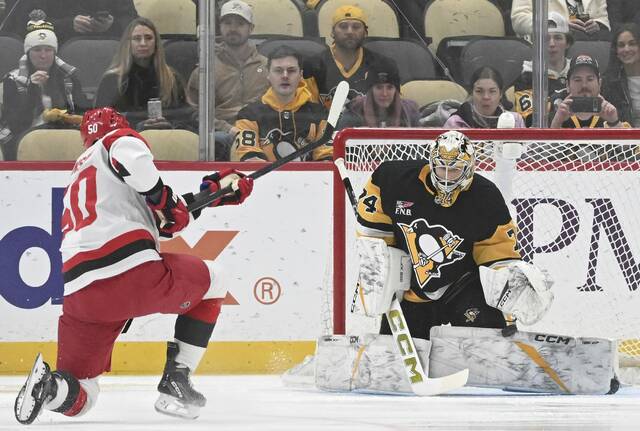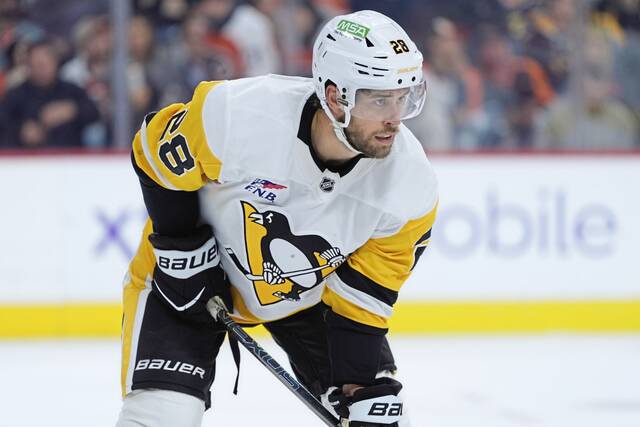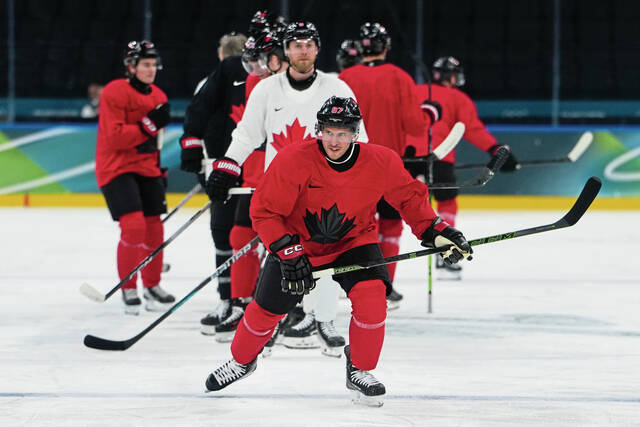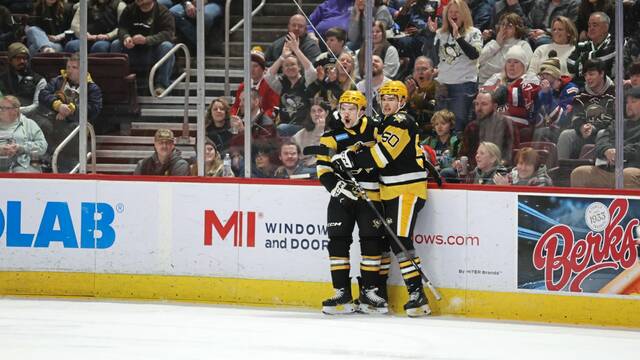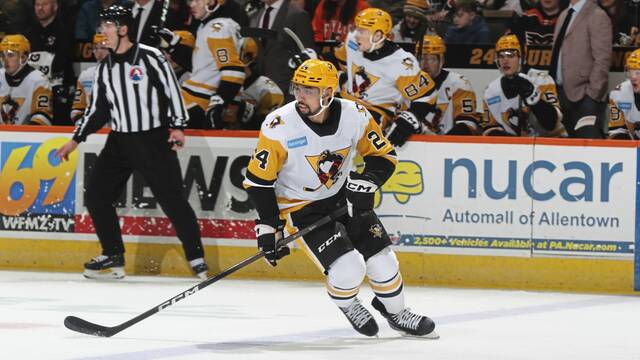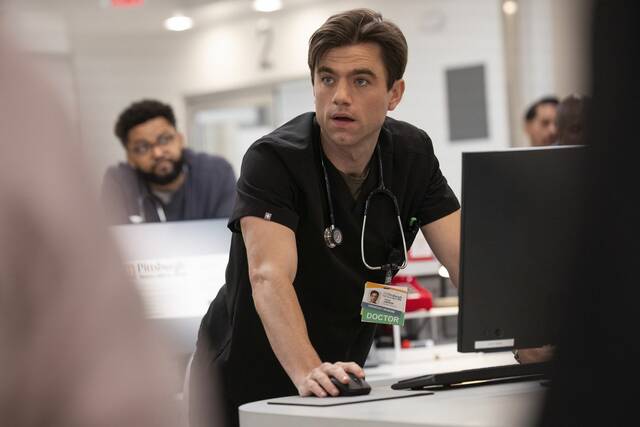Ask anyone associated with the 1993 Pittsburgh Penguins what they remember about the Patrick Division Final against the New York Islanders.
Any player. Any coach. Any fan. Any vendor at the Civic Arena.
The responses will be nearly universal. Overtime loss. Game 7. David Volek. 4-3.
Strangely, though, the one person in all of Pittsburgh who was most negatively impacted by that game on May 14, 1993 doesn’t leap to that same moment.
As the 30th anniversary of that fateful Game 7 approaches on Sunday, former Penguins forward Kevin Stevens thinks back to May 12, 1993, instead.
“I remember like it was yesterday. We’re up three (games) to two. Game 6 on the Island. After two periods, they come out and pump three in. They beat us (7-5) in Game 6. That was the one,” Stevens said during a phone call last week. “Game 7? Yeah, sure. We shoulda won that. But you can’t get to Game 7.”
You can understand why Stevens’ mind goes to Game 6 first. Because if the Penguins don’t get to Game 7, the Volek goal never happens.
And for Stevens, personally, that dump-in he tried to race down never happens. The collision with Rich Pilon never happens. His frightening fall to the ice never happens.
The hours of surgery never happen. And maybe the reliance on pain meds never happens. At least not that early in life. At least not to that degree.
“You can’t get to Game 7. You can’t get there,” Stevens said again.
But the Penguins did. So all of those things did happen. And more than anyone else who was in that building, Kevin Stevens is still living with that night three decades later.
‘They didn’t have a flight booked’
Coming off a Presidents’ Trophy regular season with 119 points and a five-game whitewashing of the New Jersey Devils in Round 1 of the playoffs, most of the hockey world expected the Penguins to plow through the Islanders in Round 2. The Isles finished in a third-place tie with New Jersey, with a pedestrian 40 wins and 87 points.
Plus, New York’s star player Pierre Turgeon (132 points) had been badly injured by a cheap shot from Washington’s Dale Hunter at the end of their first-round win against the Capitals.
That said, the Islanders won three of the seven games they played against the Penguins that year. And, having gone through two Stanley Cup runs the previous two seasons, Stevens fully expected that there was always going to be one series that would make the Penguins sweat.
In 1991, it was the seven-game, first-round survival act over the Devils. In 1992, it was coming back from 3-1 down against the Caps.
In 1993, Stevens was convinced a hand-wringer was going to play out during the Patrick Division Final against the Islanders.
“This one was going to be the one,” Stevens said. “If we could’ve gotten through the Islanders, L.A. (in the Stanley Cup Final) and Montreal (in the Wales Conference Final), we could’ve beaten those teams skating backwards. I think our team was that good.”
More sports
• Steelers open 2023 season at home against San Francisco, close it in Baltimore• Mark Madden: Stanley Cup playoffs should be a showcase, but this display is terrible
• Steelers’ Najee Harris makes appearance in wrestling ring during promotional tour of Mexico
So once the series did get to a seventh game back in Pittsburgh, Stevens may have been one of the few that wasn’t surprised. Based on what Islanders goalie Glenn Healy says, their organization didn’t exactly seem prepared for the series to be pushed beyond Game 6.
“When we went in for Game 7 to play the Penguins, the team flew out of two different airports. We didn’t have a flight,” Healy said. “So half the team flew out of MacArthur, half flew out of LaGuardia, and we met in Pittsburgh. Did they have confidence we are going to seven? I guess not. They didn’t have a flight booked.”
Entering Game 7, Stevens had 16 playoff points, second on the team to only Mario Lemieux. And he felt it was his duty to get the squad engaged early in the game.
Few power forwards at the time had the combination of size and skill that Stevens did. At 6-foot-3, 230 pounds, Stevens totaled 111 points that season, second on the team behind Lemieux.
At the 15:10 mark in the first period and after having already served a penalty, Stevens went screeching down the left side of the ice to track down what was about to become an icing call against the Penguins.
That’s when Pilon touched up the puck and Stevens collided with him.
“Both men wanted to hit. Like two butting rams,” Jiggs McDonald said on the SportsChannel New York broadcast.
Stevens sent Pilon flying toward the end boards with both skaters going airborne. But not after Pilon’s visor had clipped Stevens in the head, knocking him unconscious.
‘He never used to wear a shield’
It had to be Pilon.
A sturdy 6-foot-2, 220-pound defenseman. Pilon was a player Stevens had tangled with many times in the past.
“He always led with his head. A really tough kid. Dirty as hell. But really tough,” Stevens said of Pilon. “We played against him forever. He was probably the guy I battled with the most my whole career. Even when I was with the (New York) Rangers, I fought him three or four times. It was just crazy how much we matched up together all the time.”
Of course, Pilon was now wearing a visor. Something he hadn’t done earlier in his career, but needed to do after an eye injury sometime around the 1990-91 season.
“He never used to wear a shield,” Stevens said. “That was kinda the bummer about it. He had hurt his eye. And when I hit him, I hit his shield. And it got my temple and knocked me out cold.
Contacting Pilon’s visor at just the wrong spot rendered Stevens unconscious in mid-flight back toward the ice. Unable to brace himself, Stevens’ face took the full brunt of the fall.
“I was on the ice. And I skated up to him,” Pens defenseman Grant Jennings recalls. “And I heard him breathing. He was out cold. And he was breathing like, (Jennings replicates Stevens’ labored inhaling). And I was thinking, ‘This is not good.’ Everybody stopped in their tracks. We didn’t care what the score was at that time. That shook us.”
Stevens regained consciousness soon enough. But it took medical personnel about six minutes to get him off the ice on a stretcher. From there, Stevens remembers a rather chaotic scene around him in the locker room.
“There were so many people there. So many doctors,” Stevens said. “The eye doctor was at the game. He went around the top of my eye. And it was all crushed and he said, ‘You can’t go back in.’ … It was all soft. Up on my forehead, it’s all crushed in. He was the one that told me, ‘You gotta call it a night.’”
The bustle was significantly less by the time Stevens arrived at the hospital.
“When I got to the hospital, it was so dead. Because everyone was watching the game,” Stevens said.
From there, Stevens sat in the hospital and listened on the radio to the rest of the game. His injury hurt the Penguins. Not only were they tactically compromised, but Hall of Fame defenseman Larry Murphy says seeing their teammate stretchered off the ice threw the bench out of sorts.
“That had an impact on the eventual outcome of the game,” Murphy insisted. “We had lost a player of that ability. Obviously, everyone was concerned about his personal well-being. His head hit the ice. It was horrific.”
Stevens remembers listening to the radio broadcast from Mike Lange and Paul Steigerwald in the hospital. He vividly recounts the Penguins’ frantic late third-period comeback from a 3-1 deficit. Ron Francis scored off a Murphy pass at 16:13 of the third to pull within one. Then Rick Tocchet scored with a minute remaining on a deflected puck that had been redirected by Francis off a shot by Murphy.
“I remember that double tip. I remember them saying on the radio it deflected off two people and went in. I couldn’t believe it went in,” Stevens said, as if he was hearing the call for the first time.
But he was also listening when Volek scored the fateful game-winner at 5:16 of overtime — his second goal of the game and only his second in the playoffs.
“I read where he said that he didn’t play a lot of that game. … He said he hadn’t been out there for more than two or three shifts for two hours,” Stevens laughed. “Then he gets out there and he (expletive) scores from the sidewall.”
The Penguins’ hopes of a historic Stanley Cup three-peat were dashed. It’s a feat that still hasn’t been accomplished since the Islanders won four in a row from 1980-83. And Stevens’ career — and life — were about to be altered in a way he is still dealing with to this day.
’If you don’t activate it, you don’t know’
What followed the next morning for Stevens was major facial reconstruction. An ear-to-ear incision at the hairline. One-hundred stitches. Multiple metal plates to support the reassembled bones in his face.
And Percocet to handle the pain.
Stevens has said in the past that his recreational drug use had started a few months before the Islanders series. During a SportsNet documentary (“Shattered”) about Stevens’ struggles, he traces his drug abuse back to a night in New York City following a game against the Rangers in ‘93.
So the collision with Pilon didn’t cause Stevens’ addiction. But it certainly exacerbated the situation, specifically his reliance on pain medication.
“That didn’t help. I don’t know if it was the main reason. But it was part of it,” Stevens said. “If you are an addict, you always have that. If you don’t activate it, then you don’t know you have it. But I activated something. And from that point on, it was a struggle.”
Stevens managed another 40-goal season in Pittsburgh (his fourth in a row) during the 1993-94 campaign. But from there, Stevens’ career and his personal life began to spiral.
He wound up on four different teams, before retiring with the Penguins after the 2002 season. In 2000, Stevens entered the NHL/NHLPA treatment program after an arrest on a possession charge in St. Louis. In his post-retirement life, Stevens had multiple bouts with addiction after attempts at rehab. And he also found himself in jail once more on conspiracy and possession charges with intent to distribute oxycodone.
“He was one of the best, if not the best, power forwards for a few years,” Lemieux once told SportsNet. “He developed into this beast who could skate, hit and shoot. He had all the tools to be the best left-winger, which I think he was, for a few years in the NHL. … It’s really unfortunate that after he got injured against the Islanders, his life went in a different direction.
“He came out of it after a few months and resumed his career, but he was never the same.”
Stevens career ended with 726 points.
‘I hated him for a long time’
Stevens says he’s now a little over six years clean. He’s a special assignment scout for the Penguins, focusing on NCAA players, particularly college free agents.
Under the leadership of his sister, Kelli, Stevens has also set up the Power Forward foundation. It gives out sober living scholarships to people who are getting out of rehab and need help finding housing. Stevens also does public speaking engagements to raise awareness about addiction. How it can start. How to seek help.
Pilon has done a lot of that work too, as he ended up having some of the same struggles in post-hockey life as Stevens did.
Late in his career, Stevens was on the Rangers. One day general manager Neil Smith called Stevens to see if there may be any problem if the team acquired Pilon, which they eventually did off waivers in December 1999.
“I said, ‘Yeah, sure.’ He became a good friend of mine,” Stevens chuckled. “It’s the weirdest thing in the world. I hated him for a long time. … But when you’re teammates, whatever, it’s always good. It was no big deal. It was just part of the game. We were both trying to win. Whatever happened, happened.”
A lot happened.
More happened to Stevens than anyone else in that game. Which is probably why Stevens is one of the few that’s probably more ticked about Game 6 than Game 7.
Late in the conversation, Stevens referenced the Presidents’ Trophy winning Boston Bruins’ upset loss to the Panthers in the first round of this year’s playoffs.
“You can’t get to Game 7,” Stevens said one more time, reiterating the similarities of the two series.
Although I’m guessing the Panthers had their flight booked.
Tim Benz talks with Penguins Hall of Famer Larry Murphy, as the two flashback to the 1993 Patrick Division Final against the New York Islanders.
Listen: Tim Benz and Larry Murphy talk 1993 Pens/Islanders series




